Zondervan Biblical Languages Collection (46 vols.)
Digital Logos Edition
Overview
First published in 1993, Basics of Biblical Greek is the most popular introduction to the field, used in universities and seminaries around the world. Over 200,000 students have learned biblical Greek under its guidance. Now in its third edition, Basics of Biblical Greek has proven so successful that an entire series of curricula has been developed following its example.
With Basics of Biblical Hebrew and Basics of Biblical Aramaic making a splash in biblical language curricula worldwide, Zondervan’s proven and popular language textbooks continue to transform novices into experts. With everything from study guides to audio vocabulary downloads, covering every skill level from beginner to teacher (including specialized textbooks for re-learners), the Zondervan Biblical Languages Collection is the one-stop product for biblical language teaching and learning through Logos.
Internationally Acclaimed Textbooks
Renowned authors and teachers William D. Mounce, Miles V. Van Pelt, Daniel B. Wallace, and Gary D. Pratico pave the way through biblical Greek and Hebrew. With tools for understanding grammar, building vocabulary, and even performing better exegesis and word studies, these experts impart decades of teaching and condense years of learning into materials you can study at your own pace.
Discover nuances in language that were previously inaccessible to you—and get meaning out of it even if you don’t know Greek or Hebrew! With Greek and Hebrew audio readings, interactive workbooks, quick-reference guides, and texts for all levels of Greek, Hebrew, and Aramaic learning, this collection is essential for everyone.
Check out these additional resources on biblical Greek and biblical Hebrew and Aramaic.

- The latest editions of world-renowned introductory-level language curricula
- Audio aids for building vocabulary, mastering inflections, building memory, and growing fluency
- Workbooks, reference guides, and morphology and syntax texts for interactive learning
- Tools for instructors, students, self-learners, home-schoolers, and re-learners
- Title: Zondervan Biblical Languages Collection
- Publisher: Zondervan
- Volumes: 40
- Pages: 16,318
- Audio Length: 9 hours, 31 minutes
Textbooks and Grammars
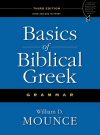
Basics of Biblical Greek Grammar
- Author: William D. Mounce
- Edition: 3rd
- Publisher: Zondervan
- Publication Date: 2009
- Pages: 448
The original Basics of Biblical Greek (BBG) offered instructors, students, self-learners, and home schoolers an entirely new, integrated approach to teaching and learning New Testament Greek. This third edition continues in that tradition, making use of feedback from professors, students, and home schooling moms and dads. BBG makes learning Greek a natural process, and shows from the start how an understanding of Greek helps in understanding the New Testament.
William D. Mounce (PhD, Aberdeen University) lives as a writer in Spokane, Washington. He is the president of Biblical Training, a non-profit organization offering the finest in evangelical teaching to the world for free. Formerly he was the preaching pastor at a church in Spokane, and prior to that a professor of New Testament and director of the Greek program at Gordon-Conwell Theological Seminary. He is the author of the bestselling New Testament Greek resource, Basics of Biblical Greek, and served as the New Testament chair of the English Standard Version translation of the Bible.
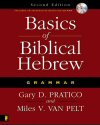
Basics of Biblical Hebrew Grammar
- Authors: Gary D. Pratico and Miles V. Van Pelt
- Edition: 2nd
- Publisher: Zondervan
- Publication Date: 2007
- Pages: 512
Basics of Biblical Hebrew, today’s best-selling introductory Hebrew grammar, is new-and-improved with additional, linguistically nuanced explanations for some of the more difficult elements in biblical Hebrew. This second edition combines the best of inductive and deductive approaches, uses actual examples from the Hebrew Old Testament rather than made-up illustrations, emphasizes the structural pattern of the Hebrew language rather than rote memorization—resulting in a simple, enjoyable, and effective learning process—, and highlights particles added to nouns and verbs using colored text, allowing easy recognition of new forms.
Gary D. Pratico (ThD, Harvard Divinity School) is professor of Old Testament and director of the Hebrew language program at Gordon-Conwell Theological Seminary. He has been teaching Hebrew for nearly 30 years. He is coauthor with Miles Van Pelt of Basics of Biblical Hebrew and The Vocabulary Guide to Biblical Hebrew.
Miles Van Pelt (PhD, Southern Baptist Theological Seminary) is the Alan Belcher Professor of Old Testament and Biblical Languages at Reformed Theological Seminary in Jackson, Mississippi, where he also serves as the director of the Summer Institute for Biblical Languages and academic dean.
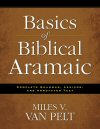
Basics of Biblical Aramaic
- Author: Miles V. Van Pelt
- Publisher: Zondervan
- Publication Date: 2011
- Pages: 256
There are 269 verses in the Old Testament written in Aramaic, not in Hebrew. Most of the verses are found in Daniel and Ezra. Basics of Biblical Aramaic follows the same easy-to-understand style found the widely used Basics of Biblical Hebrew and includes everything you need to learn biblical Aramaic. This book is designed for those who already have a working knowledge of biblical Hebrew.
Miles Van Pelt (PhD, Southern Baptist Theological Seminary) is the Alan Belcher Professor of Old Testament and Biblical Languages at Reformed Theological Seminary in Jackson, Mississippi, where he also serves as the director of the Summer Institute for Biblical Languages and academic dean.
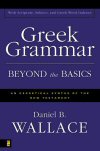
Greek Grammar beyond the Basics
- Author: Daniel B. Wallace
- Publisher: Zondervan
- Publication Date: 1997
- Pages: 864
For seminary students, the goal of studying Greek grammar is the accurate exegesis of biblical texts. Sound exegesis requires that the exegete consider grammar within a larger framework that includes context, lexeme, and other linguistic features.
While the trend of some grammarians has been to take a purely grammatical approach to the language, Greek Grammar beyond the Basics integrates the technical requirements for proper Greek interpretation with the actual interests and needs of Bible students. It is the first textbook to systematically link syntax and exegesis of the New Testament for second-year Greek students. It explores numerous syntactical categories, some of which have not previously been dealt with in print.
Greek Grammar beyond the Basics is the most up-to-date Greek grammar available. It equips intermediate Greek students with the skills they need to do exegesis of biblical texts in a way that is faithful to their intended meaning. The expanded edition contains a subject index, a Greek word index, and page numbers in the Syntax Summary section.
Daniel B. Wallace (PhD, Dallas Theological Seminary) is professor of New Testament at Dallas Theological Seminary. He is a noted textual critic, serving as head of the Center for the Study of New Testament Manuscripts, and is author of Greek Grammar beyond the Basics, Basics of New Testament Syntax, and (with Grant Edwards) of A Workbook for New Testament Syntax.
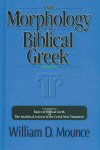
Morphology of Biblical Greek
- Author: William D. Mounce
- Publisher: Zondervan
- Publication Date: 1994
- Pages: 388
The Morphology of Biblical Greek shows second-year students that Greek is very regular in the way it forms words—if you know the rules.
The Morphology of Biblical Greek explains, in a way second-year Greek students can understand, how Greek words are formed. It shows that Greek word formation follows a limited set of rules. Once these rules are understood, it becomes clear that forms which once seemed to be irregular or an exception actually follow these morphological rules. The Morphology of Biblical Greek has five parts:
- The rules that determine how Greek words change
- The rules of verb formation, from augment to personal ending
- Paradigms for every type of noun and adjective form, with all the words that belong in each category and any peculiarities of a given word
- All the verbs and principal parts, with verbs that follow the same rules grouped together
- An index of all words in the New Testament with their morphological category
The Morphology of Biblical Greek contains the most complete set of paradigms for nouns, verbs, adjectives, and pronouns available for New Testament Greek.
William D. Mounce (PhD, Aberdeen University) lives as a writer in Spokane, Washington. He is the president of Biblical Training, a non-profit organization offering the finest in evangelical teaching to the world for free. Formerly he was the preaching pastor at a church in Spokane, and prior to that a professor of New Testament and director of the Greek program at Gordon-Conwell Theological Seminary. He is the author of the bestselling New Testament Greek resource, Basics of Biblical Greek, and served as the New Testament chair of the English Standard Version translation of the Bible.
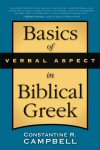
Basics of Verbal Aspect in Biblical Greek
- Author: Constantine R. Campbell
- Publisher: Zondervan
- Publication Date: 2008
- Pages: 160
Verbal aspect in the Greek language has been a topic of significant debate in recent scholarship. The majority of scholars now believe that an understanding of verbal aspect is even more important than verb tense (past, present, etc.). Until now, however, there have been few accessible textbooks.
In this book, Constantine Campbell investigates the function of verbal aspect within the New Testament Greek narrative. He has done a marvelous job in this book of simplifying the concept without getting caught up using terms of linguistics that no one except those schooled in that field can understand. The book includes exercises, an answer key, glossary of key concepts, an appendix covering space and time, and an index to Scripture cited.
Professors and students, at both the undergraduate and graduate levels, will use this is as a supplemental text in both beginning and advanced Greek courses. Pastors that study the Greek text will also appreciate this resource as a supplement to their preaching and teaching.
Constantine R. Campbell is an associate professor of New Testament at Trinity Evangelical Divinity School. He is the author of several books, including most recently Paul and Union with Christ: An Exegetical and Theological Study and Colossians and Philemon: A Handbook on the Greek Text.
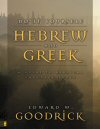
Do It Yourself Hebrew and Greek
- Author: Edward W. Goodrick
- Edition: 2nd
- Publisher: Zondervan
- Publication Date: 1980
- Pages: 260
Do It Yourself Hebrew and Greek is designed for the serious Bible student who wants to discover as accurately as possible what the Bible meant in its original languages but who is not in a position to master those languages. This manual introduces the alphabets and the basic elements of Hebrew and Greek grammar. With this foundation, the student is taught to use the basic language tools, including analyticals, lexicons, interlinears, concordances, and commentaries.
Edward W. Goodrick was on the faculty at Multnomah Bible College for many years and coedited with John Kohlenberger various biblical language study tools, including the Zondervan NIV Exhaustive Concordance.
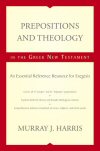
Prepositions and Theology in the Greek New Testament
- Author: Murray Harris
- Publisher: Zondervan
- Publication Date: 2012
- Pages: 304
Prepositions are important in the exegesis of the Greek New Testament, but they are at the same time very slippery words because they can have so many nuances. While Prepositions and Theology in the Greek New Testament rejects the idea of a “theology of the prepositions,” it is a study of the numerous places in the Greek New Testament where prepositions contribute to the theological meaning of the text.
Offered in the hope that it might encourage close study of the Greek text of the New Testament, its many features include the following:
- Coverage of all 17 “proper” and 42 “improper” prepositions
- Both literary and theological contexts
- Greek font—not transliteration—used throughout
- Comprehensive indexes to hundreds of verses, subjects, and Greek words
- Discussion of key repeated phrases that use a particular preposition
Murray J. Harris is professor emeritus of New Testament exegesis and theology at Trinity Evangelical Divinity School in Deerfield, Illinois.
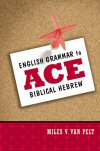
English Grammar to Ace Biblical Hebrew
- Author: Miles V. Van Pelt
- Publisher: Zondervan
- Publication Date: 2010
- Pages: 112
English Grammar to Ace Biblical Hebrew enables students of biblical Hebrew to grasp the basic concepts of English grammar that are needed in order to be able to transfer these concepts to biblical Hebrew.
One of the biggest problems students encounter learning biblical languages, especially Hebrew, is that they have either forgotten or simply do not know their English grammar. Concepts such as verb tense and voice, relative pronouns, antecedents, adjectival substantives, and the like, sound like familiar terms, but may seem foreign when it’s time to put them to practice.
With chapters such as, “To Be or Not To Be, that is the Infinitive” and “Pronouns: Grammatical Stunt Doubles,” this book is both clever and engaging. All Hebrew students will become better translators—and ultimately better pastors and leaders—with the help of this book. Tips for studying Hebrew, a glossary, and a list of additional Hebrew resources is also provided.
Miles Van Pelt (PhD, Southern Baptist Theological Seminary) is the Alan Belcher Professor of Old Testament and Biblical Languages at Reformed Theological Seminary in Jackson, Mississippi, where he also serves as the Director of the Summer Institute for Biblical Languages and Academic Dean.
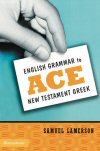
English Grammar to Ace New Testament Greek
- Author: Samuel Lamerson
- Publisher: Zondervan
- Publication Date: 2004
- Pages: 112
English Grammar to Ace New Testament Greek is designed to help you get a quick brush-up on the English grammar you’ve either forgotten or never quite learned, in a way that ties directly to your first-year Greek studies.
With chapters such as “You Ain’t Nothing but a Noun Dog” and “Inflection: Trouble Understanding Yoda You Have, Yes?” this colorful, entertaining book compares elements of English grammar with similar elements in Greek grammar. It can either be used as a one-week intensive study to prepare for Greek grammar, or be readily incorporated into actual Greek studies.
Samuel Lamerson (PhD, Trinity Evangelical Divinity School) is assistant professor of New Testament at Knox Theological Seminary in Fort Lauderdale, Florida.
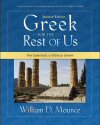
Greek for the Rest of Us
- Author: William D. Mounce
- Edition: 2nd
- Publisher: Zondervan
- Publication Date: 2013
- Pages: 320
You don’t have to be a Greek student to understand biblical Greek. If you’d love to learn Greek so you can study your Bible better, but you can’t spare two years for college or seminary courses, then Greek for the Rest of Us is for you. Developed by renowned Greek teacher William Mounce, this revolutionary crash-course on “baby Greek” will acquaint you with the essentials of the language and deepen your understanding of God’s Word. You’ll gain a sound knowledge of basic Greek, and you’ll learn how to use tools that will add muscle to your Bible studies. In six sections, Greek for the Rest of Us will help you:
- Recite the Greek alphabet
- Read and pronounce Greek words
- Learn the Greek noun and verbal system
- Conduct Greek word studies
- Decipher why translations are different
- Read better commentaries
Greek for the Rest of Us broadens your knowledge still further with an appendix on biblical Hebrew.
William D. Mounce (PhD, Aberdeen University) lives as a writer in Spokane, Washington. He is the president of Biblical Training, a non-profit organization offering the finest in evangelical teaching to the world for free. Formerly he was the preaching pastor at a church in Spokane, and prior to that a professor of New Testament and director of the Greek program at Gordon-Conwell Theological Seminary. He is the author of the bestselling New Testament Greek resource, Basics of Biblical Greek, and served as the New Testament chair of the English Standard Version translation of the Bible.
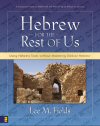
Hebrew for the Rest of Us
- Author: Lee M. Fields
- Publisher: Zondervan
- Publication Date: 2008
- Pages: 304
This is a companion volume to Greek for the Rest of Us by William D. Mounce. This book is a guide for English-only readers to understand the language of the Old Testament just enough to work with the Old Testament in more detail and to understand the scholarly literature on the Hebrew Bible. It specifically aids students in learning:
- Why translations differ
- How to do Hebrew word studies
- What the basics of Hebrew exegesis are
- How to read more advanced Old Testament commentaries with greater understanding.
Hebrew for the Rest of Us is set up in a workbook format.
Lee M. Fields is a trained Hebrew scholar with a PhD from Hebrew Union College. He is professor of Bible and theology at Mid-Atlantic Christian University (formerly Roanoke Bible College), in Elizabeth City, North Carolina.
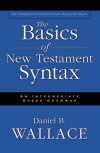
Basics of New Testament Syntax
- Author: Daniel B. Wallace
- Publisher: Zondervan
- Publication Date: 2000
- Pages: 336
Basics of New Testament Syntax provides concise, up-to-date guidance for intermediate Greek students to do accurate exegesis of biblical texts. Abridged from Greek Grammar Beyond the Basics: An Exegetical Syntax of the New Testament, the popular exegetical Greek grammar for studies in Greek by Daniel B. Wallace, The Basics of New Testament Syntax offers a practical grammar for second-year students. By showing the relevance of syntax for exegesis, this volume is perfect for preparing students to step into deeper, more practical Greek application.
Daniel B. Wallace (PhD, Dallas Theological Seminary) is professor of New Testament at Dallas Theological Seminary. He is a noted textual critic, serving as head of the Center for the Study of New Testament Manuscripts, and is author of Greek Grammar beyond the Basics, Basics of New Testament Syntax, and (with Grant Edwards) of A Workbook for New Testament Syntax.
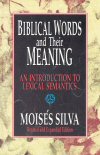
Biblical Words and Their Meaning
- Author: Moisés Silva
- Edition: 2nd
- Publisher: Zondervan
- Publication Date: 1995
- Pages: 228
When first published in 1983, Biblical Words and Their Meaning broke new ground by introducing to students of the Bible the principles of linguistics, in particular, on lexical semantics—that branch that focuses on the meaning of individual words. Silva’s structural approach provides the interpreter with an important lexical tool for more responsible understanding of the biblical text and more effective use of standard exegetical resources. This revised edition includes a bibliographical essay by Silva, “Recent Developments in Semantics,” and an appendix by Karen H. Jobes, “Distinguishing the Meaning of Greek Verbs in the Semantic Domain for Worship,” which provides the reader with a substantive example of lexical study.
Moisés Silva (PhD, University of Manchester) has taught New Testament at Westmont College, Westminster Theological Seminary, and Gordon-Conwell Theological Seminary. He is the author or coauthor of eight books and the revising editor of the Zondervan Encyclopedia of the Bible.
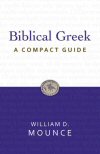
Biblical Greek: A Compact Guide
- Author: William D. Mounce
- Publisher: Zondervan
- Publication Date: 2011
- Pages: 224
Biblical Greek: A Compact Guide offers Greek students a one-stop guide for the grammar, morphology, and vocabulary of biblical Greek. This resource follows the organization and format familiar to the hundreds of thousands of students who have used Basics of Biblical Greek Grammar in their first-year Greek courses, but it is also usable by students who learned with a different grammar. By limiting its discussion to the “nuts and bolts,” Greek language students working on translation and exegesis will more quickly and easily find the relevant grammatical refreshers.
Students can, for example, check on the range of meaning for a particular word or make sure they remember how aorist participles function in a sentence. The paradigms, word lists, and basic discussions in Biblical Greek: A Compact Guide point students in the right direction and allow them to focus on more advanced Greek study.
Biblical Greek: A Compact Guide will become a valuable addition to the reference library of seminary students and pastors.
William D. Mounce (PhD, Aberdeen University) lives as a writer in Spokane, Washington. He is the president of Biblical Training, a non-profit organization offering the finest in evangelical teaching to the world for free. Formerly he was the preaching pastor at a church in Spokane, and prior to that a professor of New Testament and director of the Greek program at Gordon-Conwell Theological Seminary. He is the author of the bestselling New Testament Greek resource, Basics of Biblical Greek, and served as the New Testament chair of the English Standard Version translation of the Bible.

Biblical Hebrew: A Compact Guide
- Author: Miles V. Van Pelt
- Publisher: Zondervan
- Publication Date: 2012
- Pages: 224
Biblical Hebrew: A Compact Guide offers a one-stop guide for those who have taken first-year Hebrew to refresh the memory on language forms, grammar, and word meanings. Students who are in second-year Hebrew courses can use this reference resource to assist them in the identification of words in the biblical text and the way they are used in sentences.
Ultimately, this inexpensive reference gives the most important information on biblical Hebrew grammar.
Miles Van Pelt (PhD, Southern Baptist Theological Seminary) is the Alan Belcher Professor of Old Testament and Biblical Languages at Reformed Theological Seminary in Jackson, Mississippi, where he also serves as the Director of the Summer Institute for Biblical Languages and Academic Dean.

Keep Your Greek
- Author: Constantine R. Campbell
- Publisher: Zondervan
- Publication Date: 2010
- Pages: 96
Seminarians spend countless hours mastering biblical languages and learning how the knowledge of them illuminates the reading, understanding, and application of Scripture. But while excellent language acquisition resources abound, few really teach students how to maintain their use of Greek for the long term. Consequently, pastors and other former Greek students find that under the pressures of work, ministry, preaching, and life, their hard-earned Greek skills begins to disappear.
Campbell has been counseling one-time Greek students for years, teaching them how to keep their language facility for the benefit of those to whom they minister and teach. He shows how following the right principles makes it possible for many to retain—and in some cases regain—their Greek language skills.
Pastors will find Keep Your Greek an encouraging and practical guide to strengthening their Greek abilities so that they can make linguistic insights a regular part of their study and teaching. Current students will learn how to build skills that will serve them well once they complete their formal language instruction.
Constantine R. Campbell is an associate professor of New Testament at Trinity Evangelical Divinity School. He is the author of several books, including most recently Paul and Union with Christ: An Exegetical and Theological Study and Colossians and Philemon: A Handbook on the Greek Text.
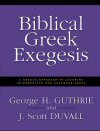
Biblical Greek Exegesis
- Authors: George H. Guthrie and J. Scott Duvall
- Publisher: Zondervan
- Publication Date: 1998
- Pages: 192
Biblical Greek Exegesis presents a proven, highly practical approach to the study of intermediate and advanced Greek grammar. Most textbooks focus on learning syntactical categories, illustrated by sentences taken from the Greek New Testament, and place little emphasis on how to apply Greek grammar to the Greek text in preparing sermons and lectures. In contrast, Biblical Greek Exegesis stresses real-life application. Beginning with selections from the Greek New Testament, students learn intermediate and advanced Greek grammar inductively by analyzing the text. The process closely resembles the approach used in sermon and lecture preparation.
This successfully field-tested approach to intermediate and advanced Greek will help students bridge the gap between understanding the categories of Greek grammar and the demand to communicate the meaning and significance of the New Testament message to the twenty-first century.
J. Scott Duvall, who received his PhD at Southwestern Baptist Theological Seminary, is professor of New Testament at Ouachita Baptist University. He is the coauthor with George H. Guthrie of Biblical Greek Exegesis: A Graded Approach to Learning Intermediate and Advanced Greek and with Terry G. Carter and J. Daniel Hays of the textbook Preaching God’s Word: A Hands on Approach to Preparing, Developing and Delivering the Sermon.
George H. Guthrie (PhD, Southwestern Baptist Theological Seminary) serves as the Benjamin W. Perry Professor of Bible at Union University in Jackson, Tennessee. A specialist in New Testament and Greek, he is the author of numerous articles and four books.
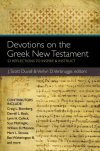
Devotions on the Greek New Testament
- Authors: Verlyn Verbrugge and J. Scott Duvall
- Publisher: Zondervan
- Publication Date: 2012
- Pages: 160
Devotions on the Greek New Testament continues on this path of excellence by introducing these devotions—based on a careful reading and study of the Greek New Testament—written by some of the top Greek scholars of today. Contributors include Scot McKnight, Daniel B. Wallace, Craig L. Blomberg, Mark Strauss, and William D. Mounce, among others.
Devotions on the Greek New Testament can be used as weekly devotional or as a supplemental resource throughout a semester or sequence of courses. The main point each devotion offers comes from a careful reading of the passage in the Greek New Testament, not from the English Bible. These authors use a variety of exegetical approaches in their devotions: grammatical, lexical, rhetorical, sociohistorical, linguistic, etc. Each devotion closes with a practical application.
Verlyn D. Verbrugge (PhD, Notre Dame) is senior editor of academic and professional books at Zondervan. He has authored several books, including Early Church History and Your Church Sign.
J. Scott Duvall, who received his PhD at Southwestern Baptist Theological Seminary, is professor of New Testament at Ouachita Baptist University. He is the coauthor with George H. Guthrie of Biblical Greek Exegesis: A Graded Approach to Learning Intermediate and Advanced Greek and with Terry G. Carter and J. Daniel Hays of the textbook Preaching God's Word: A Hands on Approach to Preparing, Developing and Delivering the Sermon.

New International Dictionary of Theology and Exegesis: Old and New Testament
- Editors: William A. VanGemeren and Moisés Silva
- Series: New International Dictionary of Theology and Exegesis
- Publisher: Zondervan
- Pages: 8,964
- Resource Type: Dictionaries
The New International Dictionary of Theology and Exegesis: Old and New Testament (10 vols.) contains thousands of articles, written by hundreds of scholars from over 100 academic institutions! This massive reference work contains articles on the theology of each individual book of the Bible, as well as discussions of biblical concepts, people, places, events, and literary pieces. The New International Dictionary of Theology and Exegesis: Old and New Testament is intended for serious biblical and exegetical study by men and women of all walks of life—both academics and pastors, students and laypersons.
Volumes one through five contain a lexicon of the Old Testament. All words found in the text are ordered by Hebrew alphabetization for easy reference, and coupled with a Goodrich/Kohlenberger cross-referencing number to be used in conjunction with Strong’s numbering system. The relationship of each word in different contexts and languages is also explained, including alternative words, and the particulars of their semantic domain. All this information is, of course, complete with bibliography. Volume five contains a series of indexes: a Hebrew index, subject index, and an index of semantic fields. This collection is an unparalleled accomplishment in the field of biblical hermeneutics.
The latter five volumes examine and discuss the major theological terms of the Bible. They allow you to unlock the significance, meaning, and nuances of words in the New Testament without having to study Hebrew or Greek! These five volumes are a basic enlargement of the German Theologisches Begriffslexikon zum Neuen Testament. On its first publication in German it was recognized as a major reference work and has since become more and more widely acclaimed as an important tool for understanding the theology and message of the Bible.
Willem VanGemeren is professor of Old Testament at Trinity Evangelical Divinity School. He is the author of a number of books, including Interpreting the Prophetic Word and a commentary on Psalms in the Expositor’s Bible Commentary series.
Moisés Silva taught biblical studies at Westmont College, Westminster Theological Seminary, and Gordon-Conwell Theological Seminary. He is the coauthor of Introduction to Biblical Hermeneutics, the author of Baker Exegetical Commentary on the New Testament: Philippians, and the revising editor of the Zondervan Encyclopedia of the Bible.

Basics of Ancient Ugaritic is a teaching grammar of this ancient language, one spoken at the time of Abraham occurring in ancient texts in cuneiform writing. Beginning with the alphabet, each new lesson builds on the ones before it. Unlike synthetic Ugaritic grammars—which have been known to be overwhelming for students—Basics of Ancient Ugaritic draws from cuneiform texts and lets students explore the language practically.
Basics of Ancient Ugaritic can be used for learning the language by individuals on their own or in a classroom setting. Each chapter concludes with a set of exercises allowing students to know whether they are grasping the fundamentals of the language. Basics of Ancient Ugaritic represents an ideal first text for entering the larger world of Semitic languages.
Michael James Williams (PhD, University of Pennsylvania) is professor of Old Testament at Calvin Theological Seminary and a member of the NIV Committee on Bible Translation. He is the author of Deception in Genesis, The Prophet and His Message, and How to Read the Bible through the Jesus Lens, and editor and contributor of Mishneh Todah. His passion is to equip students with knowledge of the Old Testament and its languages so that they may grow in their comprehension and appreciation of redemptive history and be adequately prepared to promote and defend the faith through word and action.
Audio Resources

Basics of Biblical Greek Vocabulary
- Arranged and read by William D. Mounce
- Publisher: Zondervan
- Publication Date: 2006
- Length: 60 minutes
This audio product contains all the Greek words found in the vocabulary sections of Basics of Biblical Greek, presented in the order of the lessons. Students can listen to and learn vocabulary words while reading the Logos edition of BBG on their tablet, smartphone, laptop, or desktop computer.
William D. Mounce (PhD, Aberdeen University) lives as a writer in Spokane, Washington. He is the president of Biblical Training, a non-profit organization offering the finest in evangelical teaching to the world for free. Formerly he was the preaching pastor at a church in Spokane, and prior to that a professor of New Testament and director of the Greek program at Gordon-Conwell Theological Seminary. He is the author of the bestselling New Testament Greek resource, Basics of Biblical Greek, and served as the New Testament chair of the English Standard Version translation of the Bible.

Basics of Biblical Hebrew Vocabulary
- Arranged and read by Miles V. Van Pelt and Gary D. Pratico
- Publisher: Zondervan
- Publication Date: 2006
- Length: 60 minutes
This audio product contains all the Hebrew words found in the vocabulary sections of Basics of Biblical Hebrew, presented in the order of the lessons. Students can listen to and learn vocabulary words while reading the Logos edition of BBG on their tablet, smartphone, laptop, or desktop computer.
Gary D. Pratico (ThD, Harvard Divinity School) is professor of Old Testament and director of the Hebrew language program at Gordon-Conwell Theological Seminary. He has been teaching Hebrew for nearly 30 years. He is coauthor with Miles Van Pelt of Basics of Biblical Hebrew and The Vocabulary Guide to Biblical Hebrew.
Miles Van Pelt (PhD, Southern Baptist Theological Seminary) is the Alan Belcher Professor of Old Testament and Biblical Languages at Reformed Theological Seminary in Jackson, Mississippi, where he also serves as the Director of the Summer Institute for Biblical Languages and Academic Dean.

Readings in the Greek New Testament
- Arranged and read by Jonathan T. Pennington
- Publisher: Zondervan
- Publication Date: 2003
- Length: 120 minutes
Master biblical Greek in its spoken context. Jonathan T. Pennington’s New Testament Greek Vocabulary has helped thousands of Greek students build a strong working vocabulary. Now, Readings in the Greek New Testament helps you develop fluency in biblical Greek as a spoken language. The vocabulary and grammar will become second nature as you listen to Greek in its working context, articulated with clarity and inflection. Down time becomes learning time—with an audio edge. Jonathan Pennington reads select passages from the Greek New Testament, including the Sermon on the Mount, the entire book of 1 John, and all the passages included in William Mounce’s A Graded Reader of Biblical Greek. Your command of the language will improve significantly as you supplement your studies with these audio readings.
Jonathan T. Pennington is an associate professor of New Testament interpretation at the Southern Baptist Theological Seminary in Louisville, Kentucky. The author of Heaven and Earth in the Gospel of Matthew, he has published a number of biblical language–learning tools, including New Testament Greek Vocabulary and Old Testament Hebrew Vocabulary.
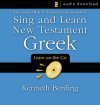
Sing and Learn New Testament Greek
- Arranged and read by Kenneth Berding
- Publisher: Zondervan
- Publication Date: 2008
- Length: 80 minutes
A new addition to the Zondervan line of biblical Greek resources, this audio resource includes everything a professor or a student will need.
Sing and Learn New Testament Greek provides a way for learning (and remembering!) New Testament Greek grammar forms through simple songs. It is not designed to compete with existing Greek grammar books, but to serve as a required supplemental resource for elementary Greek classes. Indeed, it has been designed to be used alongside of any introductory grammar. A professor can simply assign to his or her students any (or some) of the songs for the paradigms a particular elementary grammar employs. In this way, students will actually remember what they have learned (as we are all aware, people do not easily forget something learned via song).
The entire project includes songs for indicative verb endings, participles, infinitives, imperatives, contract forms, and prepositions, among others. All but the last song can be sung in 15 seconds or less. Parsing is enormously easier through this method. And it is a lot more fun than traditional methods (are we allowed to even use the word “fun” in reference to elementary Greek? Absolutely!). Beginning Greek students can listen along using Logos on their tablet or smartphone, or put it on their desktop or laptop computer. These songs are so simple that students who have used them complain about waking up in the middle of the night with the songs running through their heads. You’ll never hear that complaint from students who have had to use rote memory to learn grammar forms.
Kenneth Berding (PhD, Westminster Theological Seminary) is associate professor of New Testament at Talbot School of Theology of Biola University. He is the author of Polycarp and Paul, What are Spiritual Gifts, and Three Views on the New Testament Use of the Old Testament.

New Testament Greek Vocabulary
- Arranged and read by Jonathan T. Pennington
- Publisher: Zondervan
- Publication Date: 2003
- Length: 120 minutes
Students of biblical Greek will learn all New Testament Greek vocabulary words that occur ten times or more in the New Testament by interacting with this audio resource. Jonathan Pennington speaks all New Testament Greek words in descending order of frequency. Different tracks enable students to concentrate on different word groupings. After each citation is an opportunity for the user to give the gloss meaning of the word; then Pennington gives the gloss, confirming whether or not the user had it correctly.
Jonathan T. Pennington is an associate professor of New Testament interpretation at the Southern Baptist Theological Seminary in Louisville, Kentucky. The author of Heaven and Earth in the Gospel of Matthew, he has published a number of biblical language–learning tools, including New Testament Greek Vocabulary and Old Testament Hebrew Vocabulary.
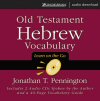
Old Testament Hebrew Vocabulary
- Arranged and read by Jonathan T. Pennington
- Publisher: Zondervan
- Publication Date: 2003
- Length: 131 minutes
In this unabridged audio edition, you’ll hear all the Hebrew words that occur 20 times or more in the Old Testament in descending order of frequency, followed by an English definition. Old Testament Hebrew Vocabulary enables a person who is taking biblical Hebrew to work on, by ear as well as through the eyes, all vocabulary words that occur in the Old Testament 20 times or more and all the names of people in the Old Testament that occur 100 times or more.
Jonathan T. Pennington is an associate professor of New Testament interpretation at the Southern Baptist Theological Seminary in Louisville, Kentucky. The author of Heaven and Earth in the Gospel of Matthew, he has published a number of biblical language–learning tools, including New Testament Greek Vocabulary and Old Testament Hebrew Vocabulary.
Workbooks and Study Guides
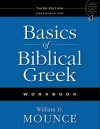
Basics of Biblical Greek Workbook
- Author: William D. Mounce
- Publisher: Zondervan
- Publication Date: 2009
- Pages: 240
This expanded workbook is designed with the student in mind and intended for use with the standard-setting Basics of Biblical Greek textbook, now in its third edition. Two optional chapters have been added to the Basics of Biblical Greek Workbook, allowing you to read large chunks of the biblical text and enjoy the fruits of your labor faster than ever before. Each chapter is divided into six sections and includes extensive exercises and significant biblical passages for translation.
William D. Mounce (PhD, Aberdeen University) lives as a writer in Spokane, Washington. He is the president of Biblical Training, a non-profit organization offering the finest in evangelical teaching to the world for free. Formerly he was the preaching pastor at a church in Spokane, and prior to that a professor of New Testament and director of the Greek program at Gordon-Conwell Theological Seminary. He is the author of the bestselling New Testament Greek resource, Basics of Biblical Greek, and served as the New Testament chair of the English Standard Version translation of the Bible.
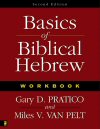
Basics of Biblical Hebrew Workbook
- Authors: Miles V. Van Pelt and Gary D. Pratico
- Publisher: Zondervan
- Publication Date: 2007
- Pages: 320
The Basics of Biblical Hebrew Workbook has just gotten better. In order to keep students from becoming discouraged, especially in the beginning stages, the authors have decided to give more vocabulary aid. Many of the minor changes in this workbook have come as a result of professor and student feedback.
Gary D. Pratico (ThD, Harvard Divinity School) is professor of Old Testament and director of the Hebrew language program at Gordon-Conwell Theological Seminary. He has been teaching Hebrew for nearly 30 years. He is coauthor with Miles Van Pelt of Basics of Biblical Hebrew and The Vocabulary Guide to Biblical Hebrew.
Miles Van Pelt (PhD, Southern Baptist Theological Seminary) is the Alan Belcher Professor of Old Testament and Biblical Languages at Reformed Theological Seminary in Jackson, Mississippi, where he also serves as the Director of the Summer Institute for Biblical Languages and Academic Dean.
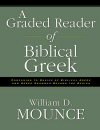
Graded Reader of Biblical Greek
- Author: William D. Mounce
- Publisher: Zondervan
- Publication Date: 1996
- Pages: 240
Making the leap from the basics of biblical Greek to its real-life application can be a frustrating challenge for students of intermediate Greek. A Graded Reader of Biblical Greek was developed to make the transition easier. It takes beginning exegetes from simple to progressively more difficult biblical texts. Students can now learn New Testament Greek the way they would any other language: through a graded program. A Graded Reader of Biblical Greek applies an inductive method to learning intermediate Greek grammar. It provides a workable introduction to exegesis, word studies, and developing a large vocabulary; and it assists the student in preparing for class, allowing classroom time to be put to its most effective use.
- Twenty Greek passages are presented in graded order
- Difficult and unfamiliar grammatical constructions are explained
- All words that occur fewer than 20 times in the New Testament are defined
- An “Exegetical Discussion” section helps the exegete gain a deeper understanding of the language
A Graded Reader of Biblical Greek is the result of ten years of use and refinement by the author in an actual classroom setting.
William D. Mounce (PhD, Aberdeen University) lives as a writer in Spokane, Washington. He is the president of Biblical Training, a non-profit organization offering the finest in evangelical teaching to the world for free. Formerly he was the preaching pastor at a church in Spokane, and prior to that a professor of New Testament and director of the Greek program at Gordon-Conwell Theological Seminary. He is the author of the bestselling New Testament Greek resource, Basics of Biblical Greek, and served as the New Testament chair of the English Standard Version translation of the Bible.
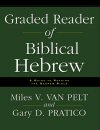
Graded Reader of Biblical Hebrew
- Authors: Miles V. Van Pelt and Gary D. Pratico
- Publisher: Zondervan
- Publication Date: 2006
- Pages: 256
A Graded Reader of Biblical Hebrew is the ideal next-step resource for the student who has completed a year of elementary Hebrew, or it can be used as a refresher for the pastor or scholar whose language skills have diminished due to lack of use. Immersion in the language is the best way to reinforce what you have already learned and to gain greater proficiency in using the language for exegesis and preaching. A Graded Reader of Biblical Hebrew is a structured introduction to the reading of biblical Hebrew texts.
Through these readings, you will be able to review basic Hebrew grammar, become familiar with issues of intermediate grammar, and gain confidence in handling the Hebrew text. The readings chosen for inclusion, which are arranged generally in order of increasing difficulty, span the whole of the Old Testament and represent some of the most important Old Testament texts from the standpoint of biblical history, theology, and exegesis.
The many notes that accompany the text include information on grammar, exegetically significant constructions, vocabulary words, idioms, bibliographic information, and more. Parsing exercises are included with each reading, and there is room for you to write your own English translation.
Gary D. Pratico (ThD, Harvard Divinity School) is professor of Old Testament and director of the Hebrew language program at Gordon-Conwell Theological Seminary. He has been teaching Hebrew for nearly 30 years. He is coauthor with Miles Van Pelt of Basics of Biblical Hebrew and The Vocabulary Guide to Biblical Hebrew.
Miles Van Pelt (PhD, Southern Baptist Theological Seminary) is the Alan Belcher Professor of Old Testament and Biblical Languages at Reformed Theological Seminary in Jackson, Mississippi, where he also serves as the Director of the Summer Institute for Biblical Languages and Academic Dean.
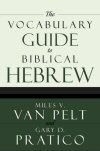
Vocabulary Guide to Biblical Hebrew
- Authors: Miles V. Van Pelt and Gary D. Pratico
- Publisher: Zondervan
- Publication Date: 2003
- Pages: 336
Acclaimed authors and teachers Miles Van Pelt and Gary D. Pratico have assembled here a guide for mastering basic Hebrew vocabulary. This guide helps seminary and Christian college students learn relevant Hebrew vocabulary conceptually. Grouping Hebrew vocabulary in three basic consonants this guide contains:
- All words occurring ten times or more in the Hebrew Bible in descending order of frequency
- Primary roots and all words derived from roots occurring ten times or more
- Unusual and difficult word list, such as proper names, adjectives, prepositions, pronouns, particles, and verbs
Gary D. Pratico (ThD, Harvard Divinity School) is professor of Old Testament and director of the Hebrew language program at Gordon-Conwell Theological Seminary. He has been teaching Hebrew for nearly 30 years. He is coauthor with Miles Van Pelt of Basics of Biblical Hebrew and The Vocabulary Guide to Biblical Hebrew.
Miles Van Pelt (PhD, Southern Baptist Theological Seminary) is the Alan Belcher Professor of Old Testament and Biblical Languages at Reformed Theological Seminary in Jackson, Mississippi, where he also serves as the Director of the Summer Institute for Biblical Languages and Academic Dean.
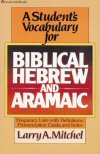
Student’s Vocabulary for Biblical Hebrew and Aramaic
- Author: Larry A. Mitchel
- Publisher: Zondervan
- Publication Date: 1984
- Pages: 112
A Student’s Vocabulary for Biblical Hebrew and Aramaic provides the student with a vocabulary list by word frequency for words appearing ten times or more in the Hebrew text. Unlike other vocabulary lists, this work combines all word forms in a single list, simplifying the student’s task of learning all words of a given frequency. Words are given in groups of 30 or fewer in order to provide the students with short, manageable learning blocks. The vocabulary list also gives the basic meaning of each word, a phonetic pronunciation guide, key information about the word’s part of speech, and the number of times each word appears in the Hebrew text. A separate section of the vocabulary list contains all Aramaic words appearing in the Old Testament. A Student’s Vocabulary for Biblical Hebrew and Aramaic is a tool that will be welcomed and used by all students of Hebrew.
Larry A. Mitchel (Thd, Pacific Union College) taught Old Testament at Pacific Union College and Laurelwood Academy and served in the Southern California Conference of Seventh-day Adventists.
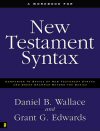
Workbook for New Testament Syntax
- Authors: Grant Edwards and Daniel B. Wallace
- Publisher: Zondervan
- Publication Date: 2007
- Pages: 192
Daniel B. Wallace’s groundbreaking books Greek Grammar Beyond the Basics and Basics of New Testament Syntax have become the standard textbooks among colleges and seminaries for teaching New Testament Greek syntax. This workbook, designed to accompany both books, presents a dynamic approach to learning Greek syntax. Instead of simply learning syntax in single-verse snippets, students are exposed to all of the major syntactical categories in exegetically and theologically significant passages. Each lesson includes passages of 15 to 30 verses from the New Testament.
Grant Edwards (ThM, Dallas Theological Seminary) is presently doing graduate work in New Testament at Princeton Theological Seminary.
Daniel B. Wallace (PhD, Dallas Theological Seminary) is professor of New Testament at Dallas Theological Seminary. He is a noted textual critic, serving as head of the Center for the Study of New Testament Manuscripts, and is author of Greek Grammar beyond the Basics, Basics of New Testament Syntax, and (with Grant Edwards) of A Workbook for New Testament Syntax.
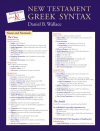
New Testament Greek Syntax Reference Sheets
- Author: Daniel B. Wallace
- Series: Zondervan Get an A! Study Guides
- Publisher: Zondervan
- Publication Date: 2009
- Pages: 6
This summary set of reference sheets of Greek Grammar beyond the Basics and Basics of New Testament Syntax is perfect for students to review categories of uses and look over possibilities when doing exegesis of the New Testament. Review these notes on the Logos app on your smartphone before your exam, or open it up alongside your A Workbook for New Testament Syntax to guide you through the homework.
Daniel B. Wallace (PhD, Dallas Theological Seminary) is professor of New Testament at Dallas Theological Seminary. He is a noted textual critic, serving as head of the Center for the Study of New Testament Manuscripts, and is author of Greek Grammar beyond the Basics, Basics of New Testament Syntax, and (with Grant Edwards) of A Workbook for New Testament Syntax.
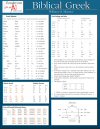
Biblical Greek Reference Sheets
- Author: William D. Mounce
- Series: Zondervan Get an A! Study Guides
- Publisher: Zondervan
- Publication Date: 2005
- Pages: 4
Students of biblical Greek and Hebrew may not know everything they need to know, but they do know there’s a lot they need to know! Whether studying for exams or translating passages of Scripture, students need critical information at their fingertips. Instead, it’s usually scattered throughout textbooks, self-made crib sheets, and sticky-notes on their computer monitor. The Zondervan Biblical Greek and Biblical Hebrew Reference Sheets are handy, at-a-glance study aids ideal for last minute review on your smartphone, a quick overview of grammar on your tablet or laptop before beginning your homework, or as an aid in translation or sermon preparation while you run the Passage Guide. The study guides are tied to Basics of Biblical Greek and Basics of Biblical Hebrew.
William D. Mounce (PhD, Aberdeen University) lives as a writer in Spokane, Washington. He is the president of Biblical Training, a non-profit organization offering the finest in evangelical teaching to the world for free. Formerly he was the preaching pastor at a church in Spokane, and prior to that a professor of New Testament and director of the Greek program at Gordon-Conwell Theological Seminary. He is the author of the bestselling New Testament Greek resource, Basics of Biblical Greek, and served as the New Testament chair of the English Standard Version translation of the Bible.
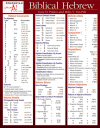
Biblical Hebrew Reference Sheets
- Authors: Miles V. Van Pelt and Gary D. Pratico
- Series: Zondervan Get an A! Study Guides
- Publisher: Zondervan
- Publication Date: 2005
- Pages: 4
Students of biblical Greek and Hebrew may not know everything they need to know, but they do know there’s a lot they need to know! Whether studying for exams or translating passages of Scripture, students need critical information at their fingertips. Instead, it’s usually scattered throughout textbooks, self-made crib sheets, and sticky-notes on their computer monitor. The Zondervan Biblical Greek and Biblical Hebrew Reference Sheets are handy, at-a-glance study aids ideal for last minute review on your smartphone, a quick overview of grammar on your tablet or laptop before beginning your homework, or as an aid in translation or sermon preparation while you run the Passage Guide. The study guides are tied to Basics of Biblical Greek and Basics of Biblical Hebrew.
Gary D. Pratico (ThD, Harvard Divinity School) is professor of Old Testament and director of the Hebrew language program at Gordon-Conwell Theological Seminary. He has been teaching Hebrew for nearly 30 years. He is coauthor with Miles Van Pelt of Basics of Biblical Hebrew and The Vocabulary Guide to Biblical Hebrew.
Miles Van Pelt (PhD, Southern Baptist Theological Seminary) is the Alan Belcher Professor of Old Testament and Biblical Languages at Reformed Theological Seminary in Jackson, Mississippi, where he also serves as the Director of the Summer Institute for Biblical Languages and Academic Dean.
Reviews
0 ratings

Robert Turner
12/22/2020
Will this collection be updated with the latest versions of the grammars and workbooks in the "basics of biblical" series?
Marco Ceccarelli
9/28/2018
Something odd in this page. No dynamic sale price? Total value if sold separately: $ 751.65 ... but $ 999.99 all toghether?